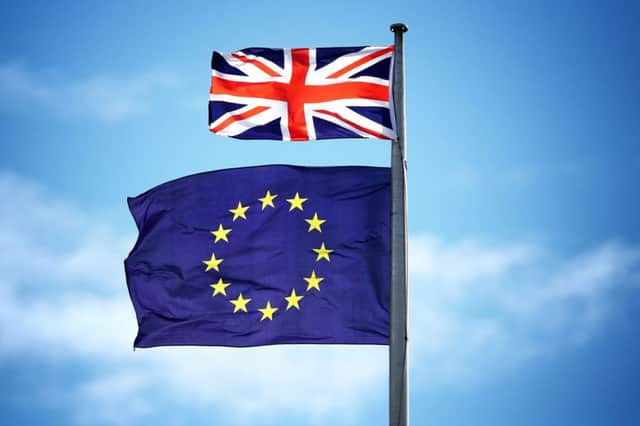Ross McCafferty: Both sides still unable to deal with Brexit


We are now one year removed from the Brexit referendum that resulted in a slim majority of UK voters backing the country’s departure from the European Union.
Politicians are marking the occasion in different ways – some Remainers are stepping up demands for the £350m that was famous plastered on the side of a bus at the campaign’s febrile height.
Advertisement
Hide AdAdvertisement
Hide AdNigel Farage, in typically modest style, shared a picture of himself celebrating what he dubbed ‘Independence Day’. The SNP challenged the ‘reckless’ positions of the now minority Conservative Government under Theresa May.
In the corridors of power in Brussels, talk has turned to the practicalities of Britain leaving the EU, with the status of EU migrants in Britain, and British migrants in EU countries, first and foremost on the diplomatic agenda.
It could be the result of her power being somewhat drained by her disappointing election result, but Theresa May’s Government has got off to an inauspicious start.
But it is the question that is still causing headaches a year on, sufficiently vague as it was for the campaign, both sides are still struggling to free themselves of its constraints.
‘Remoaners’
Those on the Remain side have struggled to get to grips with how much of the decision to leave they believe was down to immigration or trade.
None of the major parties has mooted reversing the vote to leave and only the Liberal Democrats advocate another referendum.
Even Theresa May - the Remain voting but Brexit-embracing Prime Ministe - has been ensure of how much she should repent to win over the country.
Her seeming endorsement of a so-called hard Brexit in advance of the General Election might not have been the sole reason the Tories lost seats, but something has clearly damaged her party.
Advertisement
Hide AdAdvertisement
Hide AdA train of thought suggests that the Prime Minister should have been more upfront about the challenges the country faces as Brexit looms.
Instead, she seems to have adopted the policy of the Leave campaign’s Boris Johnson, who said that he was “pro having cake, and pro eating it.”
Because there were uneasy coalitions on both sides of the debate, there seems to be a reluctance at the top of Government to risk alienating any core group of Leave supporters.
With 17million or so votes in favour of Brexit there are potentially 17million different reasons for voting that way.
Some will prioritise cutting immigration, and all the economic consequences that entails, others, fuelled perhaps by decades of tabloid scare stories, want to roll back Brussels regulations.
In walking a tightrope of almost unquantifiable opinion among Leave voters, Mrs May, along with her opponents in Labour, risks finding herself in the chasm below.
A Leave vote paints a thousand words
For the rump of the Leave campaign, with their talk of betrayal as negotiations get underway, the struggle to grasp the question seems beyond them.
A handy trick for spotting whether someone, politician, commentator or otherwise, has failed to grasp the referendum is if they start a sentence with “We voted to...” and don’t end it with “leave the European Union.”
Advertisement
Hide AdAdvertisement
Hide AdThe single, inescapable truth of the question: “ Should the United Kingdom remain a member of the European Union or leave the European Union?” - has apparently escaped many on the Leave side.
“The British people voted Leave to end the free movement of people” tweeted perennial UKIP leader Nigel Farage last year.
If Mr Farage believes that to be the case, he must have received a different ballot paper from the rest of the country.
Such statements have become de rigueur for Eurosceptics - their hitherto undetected mind-reading talents being put into full use on issues like remaining a member of the single market.
A year later, it shouldn’t be controversial to note the self evident truth: a simple (and slender) majority of the British electorate voted to leave the European Union.
Nothing more, nothing less. Everything else, as Theresa May is finding out to her apparent surprise, is up for negotiation.
With those negotiations intensifying, both Remain and Leave voters, the country at large, could be doing with a politician willing to be bold and admit it.
